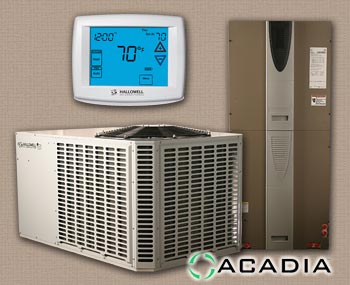Heat in a cold climate


The privately-held company is Hallowell. Of Bangor, Maine. I looked up Bangor's January temperature averages: 27.6 is the average daytime high. The overnight lows average 8.3. And the average daily average is only 18.0. Yes, those are all Fahrenheit. So those folks at Hallowell have a vested interest in keeping warm. If you want to see their data on heating efficiency, with stats on BTU capacity of Aradia,click here.
I spoke with Duane Hallowell, founder, CEO and President of the firm. He and his partners are engineers who stareted the company in 2005 without using V.C. backing. Their goal was to use existing hardware in the heat pump (and air conditioning) industry to build a system that would produce home heating even in sub-freezing weather. Hallowell was way beyond my abilities on the tech side but you can read the details about their new Acadia home climate system here.
The Breakthrough
Though it uses existing hardware manufactured for the entire heat pump and air conditioning industry, Hallowell does assemble their unique system and have added a patented process that is crucial. They've patented a method for boosted compression. That allows their system to continue to draw heat from outside air even as it drops below O Fahrenheit. In the past this has been the fault point of air-to-air heat pumps in northern North America's winter months. To prove its mettle, Hallowell's Acadia has been tested by independent utility co-ops, and not in Puerto Rico either. Cold places like northern Canada, Alaska and even Bangor, Maine.
Now says Hallowell, the man, Hallowell the company can sell you a system that does not require back-up heating systems. It runs on electricity alone. Of course, that electricty can come from the utility gird, wind, solar, geothermal or five hundred loping gazelle in harness. [Hallowell does not endorse gazelle power, that was just my invention.]
Standard Parts
Hallowell said it was necessary to build a system that uses standard components. The parts are sold all over North America. Though Hallowell asemble the system, it arrives at the building site with instructions and repair manuals that are widely-used in the HVAC industry. Not special installation training or ducting is needed. This is the hardware verison of open source tecnology. And Hallowell's Acadia does not use a single part that's unique or specially made.
I've heard this from numerous Green Tech firms from electric cars to solar companies to numerous building trades: you have to have a product that the workman and repairman can efficiently install or repair. The battery, the heat pump, the piping, the system parts need to be standard. If the size of normal plasterboard is 4 X 8, then your green, recycled, compostable plaster board substitute better be 4 X 8 and worked with the same builder's tools. Got it?
Hallowell understands that customer comfort is king in home systems. And cutting energy costs is becoing more and more necessary. So Arcadia need to be both efficient, and effective in providing dependable heat when those Bangor winds begin to blow big snow drifts. In his part of America Hallowell frequently sees home monthly heating bills reach $1,000. In many parts of the U.S. the Acadia system promises 40-60% savings on winter heating bills.
Some final notes from my conversation with Hallowell: they see further improvement coming in their industry. More efficiency, more energy saved. They are not for sale, having turned down past offers. Hallowell says their job is important and he doesn't want to see his company swallowed by some giant corporation and their mission lost. Besides, he added, I'm too young to quit. Finally, here's how they describe their goal on the Hallowell website: "all of our products contribute to the fight of making the world a cleaner and safer place for generations to come."